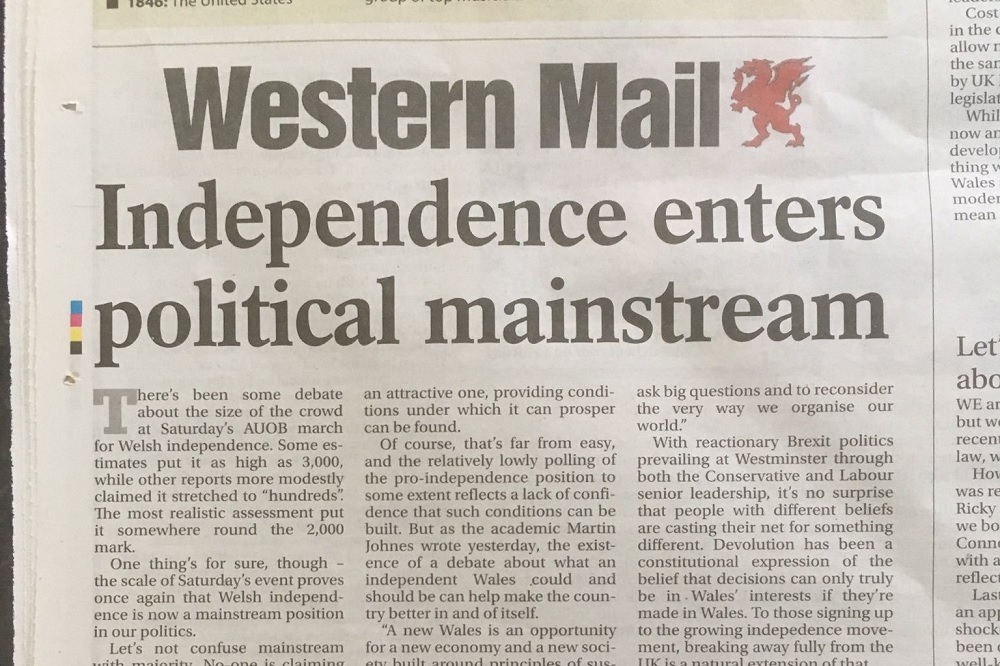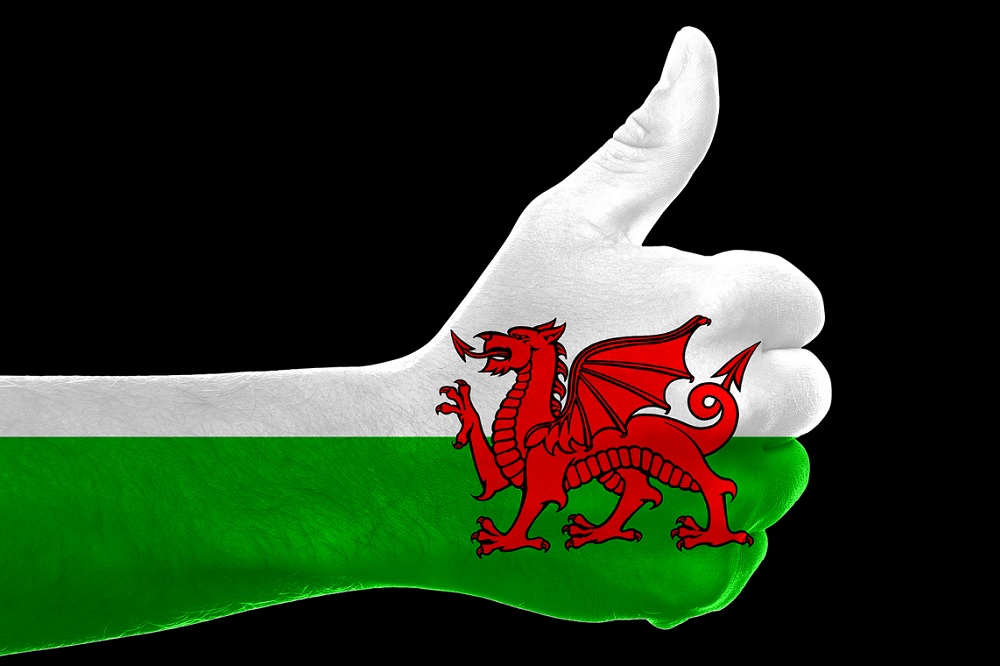Top 10 reasons why support for Welsh independence is surging

A poll published over the weekend suggested that 41% now support Welsh independence from Westminster.
It’s the highest figure ever recorded in a poll – and eight points up from 2017.
This comes after more than 3000 people from across Wales and further afield participated in the first-ever march for an independent Wales in Cardiff in May.
So why is support for Welsh independence suddenly on such a steep rise?

- Westminster isn’t working
Over the last three years or so any suggestion that Westminster was a sensible, constructive mother Parliament has gone out the window.
Whatever your views on Brexit, the process has been an utter shambles – the government has failed to get its Brexit deal through and MPs haven’t been able to agree on any way forward.
Both main parties are unpopular. But the archaic First Past the Post system, which has been ditched by most countries – including Wales and Scotland’s parliaments – means that it is very difficult to vote parties out and let someone else have a go.
The whole fiasco has also revealed how undemocratic Westminster can be. The unelected House of Lords have a big say on proceedings and we keep swapping Prime Ministers and opposition leaders based on the whims of small but ideologically intransigent party memberships.
The sight of MPs trooping in and out of a Victorian mock-Gothic chamber to vote multiple times in an evening without being able to decide on anything has become farcical.

- There’s no sign of an end to Tory rule
Wales doesn’t generally elect very many Tory MPs – in fact, it hasn’t done so since men with property were given the vote back in 1868.
However, it has been ruled by a Tory Government for over half the time since then. This isn’t surprising when you consider that Wales only elects 40 out of 650 MPs, which is 6% of the total. We don’t often get what we vote for.
Upswings in a desire for Welsh autonomy tend to come after long periods of Tory rule at Westminster. The vote for devolution came in 1997, after the Tories had been in charge for 18 years.
The Conservatives have now been in charge for a further decade and, given the poor electoral state of the Labour party, they don’t look like leaving office for the foreseeable future.
It’s unsurprising therefore that some Welsh people are looking for the escape hatch. They want to live in a country where they get the politicians they voted for.

- Scotland and Northern Ireland are going for it
Scottish First Minister Nicola Sturgeon wants a second independence referendum before 2021, and a new poll suggests Scotland will vote for it if Boris Johnson becomes Prime Minister.
Meanwhile, opinion polling in Ireland suggests that people in the Republic of Ireland and Northern Ireland are increasingly keen on reunification if Brexit goes ahead.
If Scotland and Northern Ireland do bid adieu to Westminster rule, that would leave only England and Wales in the ‘union’.
Under those circumstances, Wales would have no chance of being treated as an equal partner. It would be as much part of England as it is the England Cricket Team.
It’s no wonder that many in Wales are considering this future and coming to the conclusion that they might be better off out, as part of the EU or not.

- Labour and Plaid Cymru are talking about it
Major political change often comes from the people but for the first time, the biggest political parties in Wales are embracing independence as a distinct possibility.
Last week, former First Minister Carwyn Jones said there was an increased interest in independence, driven by the “shambles” at Westminster.
He will take part in an event organised by YesCymru in August.
Meanwhile, Plaid Cymru’s new leader Adam Price has become a fierce proponent of independence, saying that Wales should hold a referendum on it in the next few years.
He has argued that after decades of poverty and neglect, Westminster is not fit to represent Wales.

- YesCymru are campaigning for it
The YesCymru campaign group got started in 2014 in order to support the campaign for independence in Scotland.
But when that campaign came to an end, the group turned its attention to Wales and now have over 800 members and over 40 branches all over Wales.
This is the first time an organised campaign for Welsh independence has been fought and it has done a huge amount to raise awareness of independence as an option that is on the table.
Other groups have popped up since then, such as Undod, Labour for an Independent Wales, and All Under One Banner Wales, to campaign on different fronts.

- The Welsh media are discussing it
The English-language Welsh media has been very weak historically, with what is available generally owned by companies outside Wales such as Reach, or part of British public service broadcasters, and therefore with little interest in discussing Welsh independence.
But the rise of crowdfunding has made it possible for people to finance their own news services, such as Nation.Cymru and Desolation Radio, who have given people a platform to discuss previously ignored political possibilities.
This has expanded the scope of the Welsh public sphere in unexpected new directions and now even the mainstream Welsh media such as the Western Mail are discussing independence as a real political choice.

- People don’t feel their lives are improving
This relates back to point one. After a decade of austerity, and eleven years after the financial crash, people aren’t seeing their lives getting better.
While the economy is growing, the wealth seems to be creamed off by those on the top while many workers feel they have seen no real improvement in wages.
Meanwhile, Wales has some of the worst poverty in the UK – one in three children are living below the poverty line.
Under these circumstances, it is no wonder that people are looking for alternatives to the political status quo.

- Wales’ self-confidence is on the up
It’s fair to say that Wales used to have something of a chip on its shoulder – it didn’t consider its own cultures, its own identities, even its language and dialects, as something worth boasting about.
During these last twenty years of devolution, however, Wales has got its self-confidence back. Support for some autonomy has risen from 50% in 1997 to most people wanting more autonomy today.
There is a growing Wesh civic identity that anyone, no matter their culture, language, ethnicity, or gender, feel that they can buy in to.
Cardiff isn’t loved by everyone but it is a wealthy, vibrant European capital and shows that there’s nothing necessarily stopping us from succeeding economically, either.
We now value having control over our own affairs, and take more pride in our own achievements as a nation. We don’t consider ourselves better than anyone else, but we are at least equal.
And as our self-confidence as a nation improves, our desire for more control over our own affairs has naturally risen as well.

- Wales could disappear
This is the other side of the coin from the last point. While Wales has never been happier in its own skin, the threats to Wales’ future have never been so apparent.
Much of the country remains in the economic doldrums and Brexit could exacerbate this. The population continues to age, threatening cultural and linguistic communities.
High house prices and job opportunities are leading to a ‘brain drain’ of young people over the border.
A rollback of Welsh autonomy could happen very quickly as Westminster looks to take back powers for itself after Brexit. This has already begun.
If Wales doesn’t become independent soon, and take control of its own economic future, some argue, many of the things that make it Wales could cease to exist.

- There are a lot of good arguments for becoming independent
At the end of the day, people wouldn’t be discussing Welsh independence at all if they didn’t believe it was a very good idea.
People are looking around at our small, independent neighbours and realising that there’s no good reason a country of 3m can’t be successful.
The Republic of Ireland, our nearest independent neighbour, with a population of less than 2m more than Wales, has a GDP per head of £50,000, double Wales’ GDP of around £23,000.
Iceland, a rich, tiny nation of 300,000 people, has enjoyed a staggering economic growth since the last financial crash.
They also look at the natural resources that Wales has in winds and tides and wonder why, in the age of renewable energy, Wales couldn’t be self-sufficient. Wales is already the fifth largest exporter of electricity in the world.
And then they look at the shambles Westminster is making of things and Wales’ poverty and asking themselves ‘could we really not do any better than this?’
You can read YesCymru’s arguments for becoming independent here.
Support our Nation today
For the price of a cup of coffee a month you can help us create an independent, not-for-profit, national news service for the people of Wales, by the people of Wales.






